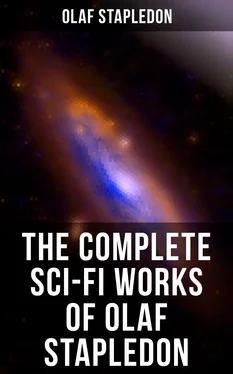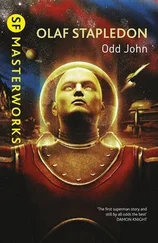Olaf Stapledon - The Complete Sci-Fi Works of Olaf Stapledon
Здесь есть возможность читать онлайн «Olaf Stapledon - The Complete Sci-Fi Works of Olaf Stapledon» — ознакомительный отрывок электронной книги совершенно бесплатно, а после прочтения отрывка купить полную версию. В некоторых случаях можно слушать аудио, скачать через торрент в формате fb2 и присутствует краткое содержание. Жанр: unrecognised, на английском языке. Описание произведения, (предисловие) а так же отзывы посетителей доступны на портале библиотеки ЛибКат.
- Название:The Complete Sci-Fi Works of Olaf Stapledon
- Автор:
- Жанр:
- Год:неизвестен
- ISBN:нет данных
- Рейтинг книги:5 / 5. Голосов: 1
-
Избранное:Добавить в избранное
- Отзывы:
-
Ваша оценка:
- 100
- 1
- 2
- 3
- 4
- 5
The Complete Sci-Fi Works of Olaf Stapledon: краткое содержание, описание и аннотация
Предлагаем к чтению аннотацию, описание, краткое содержание или предисловие (зависит от того, что написал сам автор книги «The Complete Sci-Fi Works of Olaf Stapledon»). Если вы не нашли необходимую информацию о книге — напишите в комментариях, мы постараемся отыскать её.
Novels:
Last and First Men: A Story of the Near and Far Future
Last Men in London
Odd John: A Story Between Jest and Earnest
Star Maker
Darkness and the Light
Sirius: A Fantasy of Love and Discord
Death into Life
Short Stories:
The Flames (1947)
The Seed and the Flower
The Road to the Aide Post
A Modern Magician
East is West
A World of Sounds
Arms Out of Hand
The Complete Sci-Fi Works of Olaf Stapledon — читать онлайн ознакомительный отрывок
Ниже представлен текст книги, разбитый по страницам. Система сохранения места последней прочитанной страницы, позволяет с удобством читать онлайн бесплатно книгу «The Complete Sci-Fi Works of Olaf Stapledon», без необходимости каждый раз заново искать на чём Вы остановились. Поставьте закладку, и сможете в любой момент перейти на страницу, на которой закончили чтение.
Интервал:
Закладка:
Such is the essence of our method. First we have to attain the momentary glimpse of eternity, or, more precisely, to take up for one instant the point of view of eternity. Then by imagination and sympathy we have to re-enter the stream of time by assuming the fundamental form of the minds or the mind that we wish to observe. In this process we have to work by means of a very delicate ‘selectivity’, not wholly unlike that physical selectivity which you exercise when you pick up ethereal messages on a particular wave-length. But this process of picking up past minds is far more delicate, since the system of basic mental patterns is very much more complex than the one-dimensional series of wave-frequencies.
When our ancestors first acquired the power of ‘entering into the point of view of eternity’ they suffered many disasters through ignorance of its principles. Very many of the earliest explorers succumbed simply by failing to keep their bodies alive during the trance. Their sleep turned into death. Others fell into such violent convulsions that they damaged themselves irreparably, and were mercifully killed by the superintendents. In other cases the normal trance lasted indefinitely, the body remaining alive but unresponsive for millions of years. A section of the catacombs was until recently filled with these persons, who were looked after by the attendants in the hope that some day they might wake. But a few thousand years ago it was decided to do away with some, and use others for experimental purposes.
Of the early explorers who successfully emerged from ‘the point of view of eternity’ into some past epoch, many returned insane. Others, though sane when they woke, kept falling into the trance again and again. Others were so embittered by their experiences that they became plague-spots in the community, and had to be requested to stop their hearts. Of these, some few refused, and remained at large, doing so much damage that finally they were put to death. One or two of the pioneers, and one or two of my contemporaries also, have returned from the trance with a peculiar kind of insanity, which suggested that they had actually found their way into the future, and that they still regarded our contemporary world as an episode in the remote past. Unfortunately they could give no account of their experiences; but in one of the earliest cases the recorded ravings seem to refer to the Mad Star, which did not earn its name until long afterwards.
In the early stages of the work few persons were engaged on it, and all that they could do was to collect random incidents from the very recent past. Gradually, however, the technique was greatly improved. It became possible to inspect almost any sequence of events in the history of our own species. This could only be done because the basic mental patterns of all the races of our own species had already been fairly well worked out by our psychologists and historians. Later, however, the psychologists began to formulate a vast theoretical system of possible basic mental patterns; and after some barren experimenting the explorers finally learned to assume certain of these patterns in the trance. The result was startling. Not only did they, as was expected, gain access to many primitive cultures upon Neptune, but also they began to find themselves sometimes in alien worlds, apparently much smaller than their familiar planet. The proportions of common things were all altered. The seas rose into great waves; the lands were often buckled into huge mountain ranges. The native organisms, though unfortified by artificial atoms, were able to attain great size and yet remain slender and agile. And these facts were observed through the medium of human types the existence of which had never been guessed. The very planets which these races inhabited could not be identified. No wonder, since all traces of Earth and Venus had long ago been wiped out by the solar collision that had driven man to Neptune.
This discovery of past worlds was even more exciting to us than the discovery of America to your own ancestors; for it entailed incidentally the overthrow of a well-grounded theory, which traced the evolution of the human race to a primitive Neptunian organism. Interest in the exploration of the past now greatly increased. The technique was developed far beyond the dreams of the early explorers. Little by little the outline of man’s whole history on Earth and Venus was plotted, and tract after tract of it was elaborated in some detail.
In observing these extinct species, the explorers found traces of experience very different from their own. Although, of course, the basic mental pattern or temperamental ground-plan was in every case one which the explorer himself had been able to conceive, and even in a manner assume, in order to make contact with these primitive beings at all, yet when the contact had been made, he seemed to enter into a new mental world. For instance, he had to deal with minds whose sensory powers were much more limited than his own. Looking through those primitive eyes, he saw things in much less detail than through his own eyes, so that, though he observed everything with all the precision that his host’s crude vision could afford, yet everything seemed to him blurred, and out of focus. The colours of objects, too, were diluted and simplified; for several colours familiar to us are hidden from more primitive eyes. Consequently the world as seen through those eyes appears to us at first strangely drab, almost monochromatic, as though the observer himself had become partially colour-blind. The other senses also are impoverished. For instance, all touched shapes and textures seem curiously vague and muffled. The sensations of sexual intercourse, too, which with us are richly variegated and expressive, are reduced in the primitive to a nauseating sameness and formlessness. It is impossible for you to realize the jarring, maddening effects of this coarseness and emptiness of all the sensory fields, especially to the inexperienced explorer, who has not yet learned to submit his spirit generously to the primitive.
In the sphere of thought, we find all the primitive species of man, however different from one another, equally remote from ourselves. Even the most advanced members of the most advanced primitive species inhabit worlds of thought which to us seem naïve and grotesque. The explorer finds himself condemned to cramp the wings of his mind within the caging of some gimcrack theory or myth, which, if he willed, he could easily shatter. Even in those rare cases in which the ground-plan of some edifice of primitive thought happens to be true to the simplest basic facts of the cosmos, as in your own theory of relativity, the super-structure which it ought to support is wholly absent. The explorer thus has the impression that the cosmos, with himself in it, has been flattened into a two-dimensional map.
In the sphere of desire the explorer has to deal with very unfamiliar and very jarring kinds of experience. In all human species, of course, the most fundamental animal desires are much the same, the desires for safety, food, a mate, and companionship; but the kind of food, the kind of companionship, and so on, which the primitive human mind seeks, are often very foreign and distasteful to us. Take the case of food. Of course the explorer’s body, lying in the catacombs on Neptune, does not, if perchance he is inhabiting some primitive glutton of the past, suffer dyspepsia; save occasionally, through the influence of suggestion. But none the less he may experience acute distress, for his brain is forced to accept sensory complexes of overeating which in normal life would disgust him. And they disgust him now. Even when overeating does not occur, the food percepts are often repulsive to our centres of taste and odour. In the matter of personal beauty, too, the explorer is at first repelled by the grotesque caricature of humanity which among primitive species passes for perfection, much as you yourselves may be repelled by the too-human animality of apes. Often, when he is following the growth of some primitive love-sentiment in your epoch, he is nauseated by the adored object, and by the intimacy in which he is reluctantly entangled. It is much as though a part of the mind were to watch the other part entrapped into romantic adoration of a female ape; as if with infinite disgust one were to find himself pressing against those hairy thighs. But indeed in this matter, as in others, since it is not mere animality that disgusts, but the failure to be human, the explorer is far more outraged than if he were compelled to cohabit with an ape. With familiarity, however, these repulsions can be surmounted. Just as your disgust of the ape’s approximation to the human is a weakness in you, due to lack of vision and sympathy, so our tendency to a disgust of your own crude approximation to the human is a weakness in us, which we have to learn to transform into a reverent, though often ironical, sympathy. Just as the surgeon may become accustomed to delving among viscera, and may even find beauty in them, so the explorer may and must accustom himself to all these primitive forms, and find beauty in them too. Of course the beauty which he discovers in the adored yet repulsive ape-woman is never simply identical with the beauty which delights the adoring ape-man; for it is a beauty which includes within itself both that which delights the primitive and that which disgusts the developed mind.
Читать дальшеИнтервал:
Закладка:
Похожие книги на «The Complete Sci-Fi Works of Olaf Stapledon»
Представляем Вашему вниманию похожие книги на «The Complete Sci-Fi Works of Olaf Stapledon» списком для выбора. Мы отобрали схожую по названию и смыслу литературу в надежде предоставить читателям больше вариантов отыскать новые, интересные, ещё непрочитанные произведения.
Обсуждение, отзывы о книге «The Complete Sci-Fi Works of Olaf Stapledon» и просто собственные мнения читателей. Оставьте ваши комментарии, напишите, что Вы думаете о произведении, его смысле или главных героях. Укажите что конкретно понравилось, а что нет, и почему Вы так считаете.












